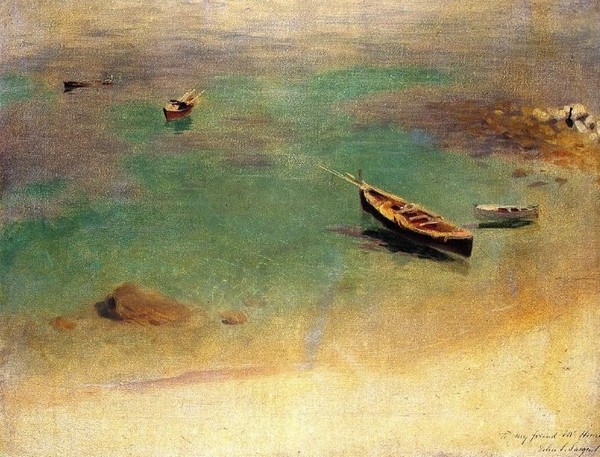
Family and friends aside, live music and the sea are the two things I'm missing the most during these weeks that have already become months. As regards concerts, things seem to be moving along, and I’ve got really lost and I don't know at which unlockdown phase we’ll be allowed to go swimming; I'll be patient just a little longer, while we continue to listen to canned music only and looking at sea pictures. Or we can do both things at the same time.
This week, we have a new brand cycle and a new brand composer: Sea Pictures, by Edward Elgar. After the great success achieved by the composer at his forty-two with the premiere of the Enigma Variations in June 1899, the Norwich Festival commissioned him with a cycle of songs to be sung by contralto Clara Butt, who at only twenty-seven was already one of the great stars of the singing world. Elgar composed Sea Pictures in July 1899 and premiered them at the festival on October 5 that year, with great public success. On that day, there was also something beyond music that shocked the audience and was mentioned in most publications: the singer, who being 1.80 m tall should have had a strong stage presence, sang dressed as a mermaid. There are no photos and I couldn’t find any description of the dress; I can hardly imagine how a mermaid dress might have been in that time but, according to its impact it should have been really awesome!
In Norwich, the orchestral version of the cycle was premiered; two days later the version with piano accompaniment was premiered in London, and it was again a success (that time the chronicles didn’t tell anything of Clara Butt's outfit), and the songs quickly became popular. Critics, however, weren't as enthusiastic as the audience. In fact, they weren't enthusiastic at all, and recent publications don't talk passionately about the cycle either.
Elgar was criticized for not being a born songwriter; it's said that most of the seventies songs he composed have a mundane character, as if for him, songs were not as intimate as usually were for most of his colleagues. Elgar is the oldest composer of the generation which began the modern Art Song, and it's said that his songs were still marked by the Victorian era. They should have been, because he began to compose during that time, despite being its last years; in fact, shortly after the London premiere of the cycle, a private performance for Queen Victoria was given.
Another thing that is also said about the composer is that he chose mediocre poems for his songs. Talking about Sea Pictures, besides, the five songs have texts by five different poets, so you can already imagine what it's said: that the cycle lacks unity, because the only thing that the poems have in common is that they speak of the sea, with very different approaches.
The point, however, is that this disparity results in a very varied cycle, which I would say makes singers happy. Songs were very long and elaborate, with orchestrations which sound even Wagnerian, songs of a more intimate nature or even the delicate miniature that we will hear today, In Haven (Capri), which talk about how love is safe from storms. The allusion to the small island of Capri takes us to the Mediterranean landscapes so familiar to some of us, but also, in that time context, to a place that was also a shelter for some Europeans who wanted to live without being judged (among them, the painter John Singer Sargent, who illustrates this article).
The author of the poem was Alice, the composer's wife, a poetic source to which Elgar often turned to. Two years earlier he had written a song with that poem, published in a cultural magazine, The Dome, in 1898. In July 1899, the couple went back to it; Alice made some changes, rearranging the strophes and modifying some verses, and Edward orchestrated it; thus, that song that once was Love alone shall stay became In Haven, the second of Sea Pictures. It is the shortest of the five songs by far. They are only three stanzas of three verses each, and the song is essentially strophic. The vocal line remains constant and the orchestra changes subtly in the second stanza and more evidently in the third. The song is calm and transparent; we are sheltered and the poem storms remain away; we only feel the calm sea movement in the port.
It's a very beautiful song that we're listening in a reference recording, that of Janet Baker, John Barbirolli and the London Symphony Orchestra, from 1965. I hope you like it and it takes you to the transparent waters that are waiting for us.
Closely let me hold thy hand,
Storms are sweeping sea and land;
Love alone will stand.
Closely cling, for waves beat fast,
Foam-flakes cloud the hurrying blast;
Love alone will last.
Kiss my lips, and softly say:
Joy, sea-swept, may fade to-day;
Love alone will stay.


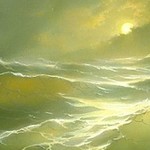
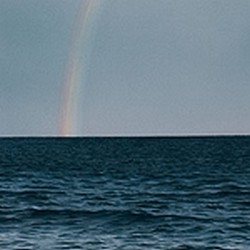 Last we...
Last we...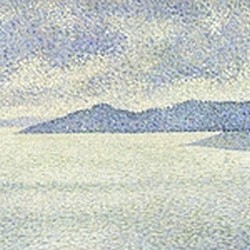 This wee...
This wee...
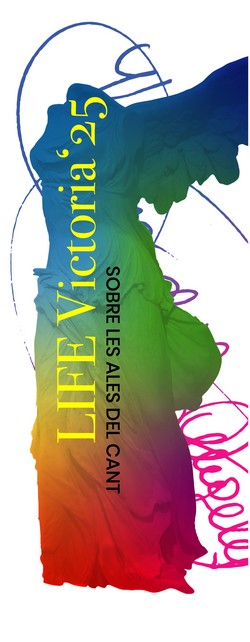











Comments powered by CComment